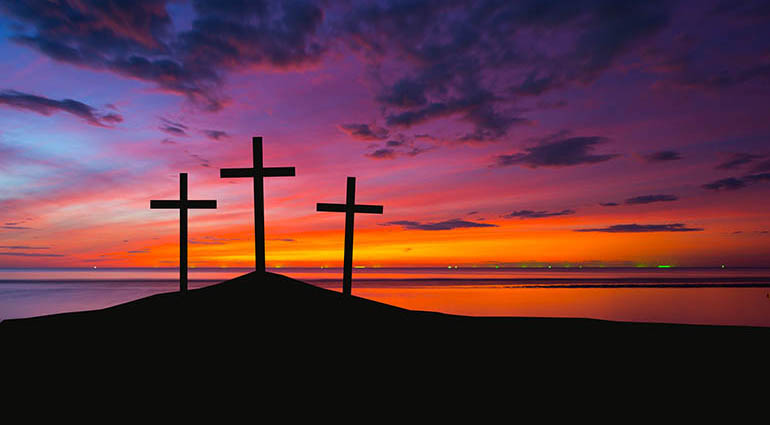IF ANY FIRST-century historical individual could be credited with the largest pressure on the primitive Jewish Christians to adopt a form of trinitarian thinking, it would be the wilderness apocalyptic preacher known as "John the Baptist". It sounds kind of whacky, but it's true! Let's take a moment to recap our Journey thus far, in this the last of four instalments into John the Baptist, and why I reach this conclusion.
In Part 1, I just wanted to get straight to the point and offered 9 bullets that reconstruct how John's ministry was necessarily contrasted with Jesus' baptism with the Holy Spirit, and concluded: This trinitarian saying [trinitarian baptismal formula] was said over converts by Jewish Christians in the latter half of the first century as a part of their baptism rites, and the confusion was at last resolved. This mutation of Judaism had astarted to vocalise, ritualise and (although they did not know it) immortalise its "Triune Hub".
In Part 2, I wanted to demonstrate how significant John the Baptist was from a non-Christian source, the Jewish historian Josephus. Here John receives as much attention from Josephus as Jesus. He is understood to have had massive influence such that even that God himself would overturn Herod's army in vengeance against the execution of his beloved prophet, John.
In Part 3, I took on the problem of the date of John's death, which is problematic if you cross the gospels' chronology with that of Josephus, but also a good angle from which to look at how the portrayal may have developed over the later stages of the first century. Here I present, gospel author by gospel author, the portrayal of John the Baptist, noting first in Mark the basic events and assumed death of John and Luke's expanded version which includes John's own birth narrative alongside Jesus'. Then we saw that Matthew almost seems to take on the challenge against the Josephus chronology, integrating narrative that explicitly informs Jesus of John's tragic demise. Finally, we saw in John's gospel that the author simply allows Jesus to "steal the show", allowing John to slip from view once he has served his purpose to point to the light.
What I failed to note in looking at Matthew (and regular readers will know I have a special relationship with Matthew!), is the relevance of the date of Antiquities, where Josephus describes John's ministry and death. It was written no later than 94 AD, but possibly earlier. Given all the other late indicators I am seeing for Matthew, I would suggest that this over-emphasis on Jesus' interaction with John's death is a firm contribution to a composition date of Matthew around the 90s close to John. It obviously contributes to the strong consensus that composition by the disciple Matthew is very unlikely.
Another thing we didn't do was look at the passages in Acts that refer to him. We'll not lose too much time on them individually now, as there are actually 9 of them, but they really do consistently echo what we have been saying all along: the contrast between the two main first-century Jewish figures, and that John points to Jesus. For that to mean something big so much decades later, can only mean that John's ministry continued to make a huge splash in Judea and beyond for decades.
Thus, regardless of when John really died, John's memory is dedicated to being that of a star player that nonetheless pointed to the hero and saviour of all, Jesus Christ, the inaugurator of the new Eschatological Age of the Spirit! It is with these ideas in mind that I called this last part: The Star Points To Another Who Points To Another.
Thank you for following the journey, blessings.
For reference, those 9 bullets again, followed by all New Testament references to John.
- John's impact was really very big indeed and his renown mid-first-century may have been comparable with Jesus', see for example Apollos' of Alexandria's familiarity with his ministry in Acts chapter 18 and Paul's encounter with 12 disciples in Ephesus in the following chapter.
- A clear historical relationship connects these major first-century Jewish players of John and Jesus; some credible scholars, have Jesus first being John's disciple before starting his own movement.
- We have no texts of any followers of John.
- For Jesus followers, Jesus has to be bigger and better than John. If John was great, and Jesus much greater than him. This could only have contributed to his final exalted status.
- Contrary to popular Christian apologetics, killing a leader does not necessarily kill off the sect he started unless he is resurrected. John is solid proof of that.
- John and Jesus are firmly differentiated on the following grounds:
- the Christ was more successfully understood to have really been raised back to life, unlike the rumours that surrounded a resurrection for John,
- John's humility seems genuine and may indeed have heralded the coming Messiah, turning down offers of honour, recognition and prestige (which ironically had the opposite effect), while Jesus combined humility and the messiahship,
- Jesus baptised with the Holy Spirit; John baptised with water.
- Since both martyrs were hugely influential baptisers and their ministries overlapped, their baptisms (and order of death) were at times confused.
- Someone, somewhere, decided: enough is enough and came up with the threefold baptismal formula to clear it up once and for all. This may have been the author of Matthew's gospel, (whom I strongly believe wrote later than Luke and Acts, which bear witness to the confusion), or it may have been the author of the part of the Didache that also contains the baptism formula. Since both those sources are Jewish, that someone was almost certainly a strongly Jewish Christian (leader).
- Conclusion: This trinitarian saying was said over converts by Jewish Christians in the latter half of the first century as a part of their baptism rites, and the confusion was at last resolved. This mutation of Judaism had started to vocalise, ritualise and (although they did not know it) immortalise its "Triune Hub".




